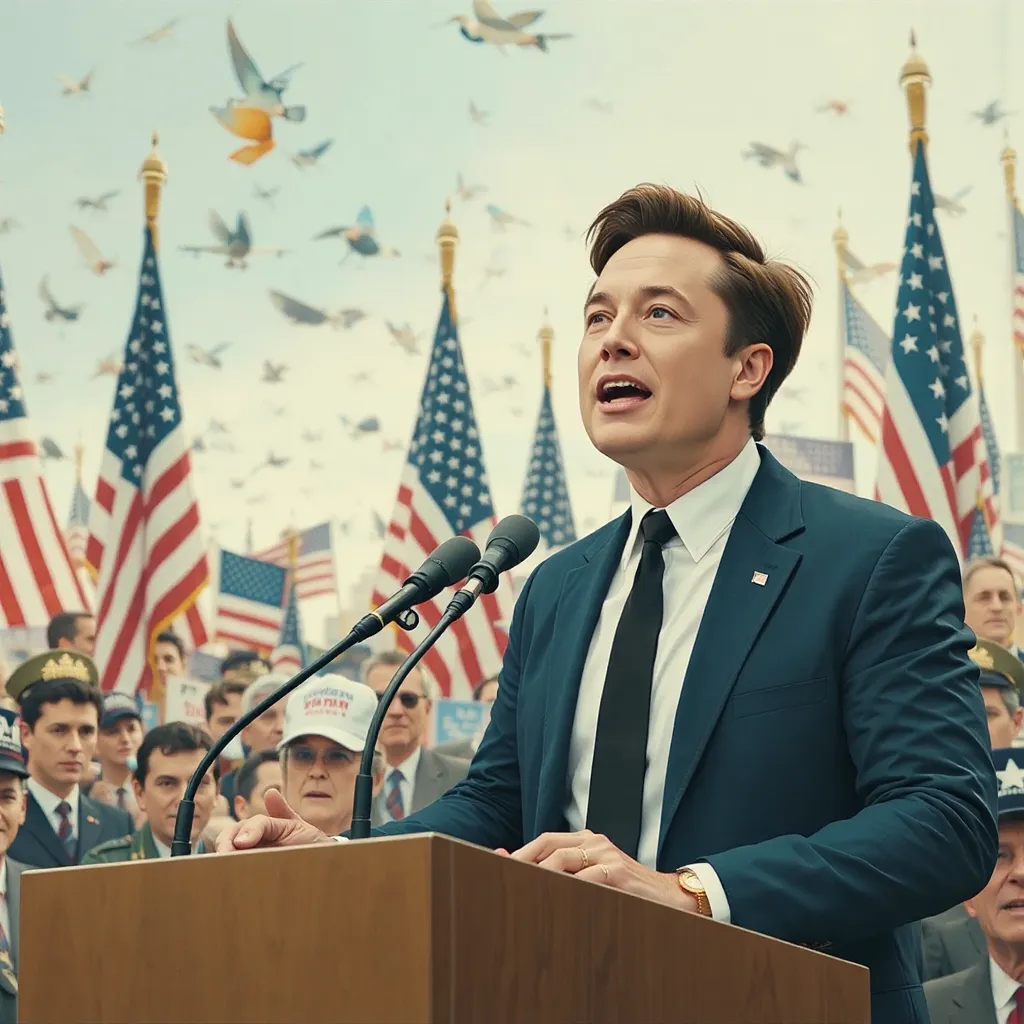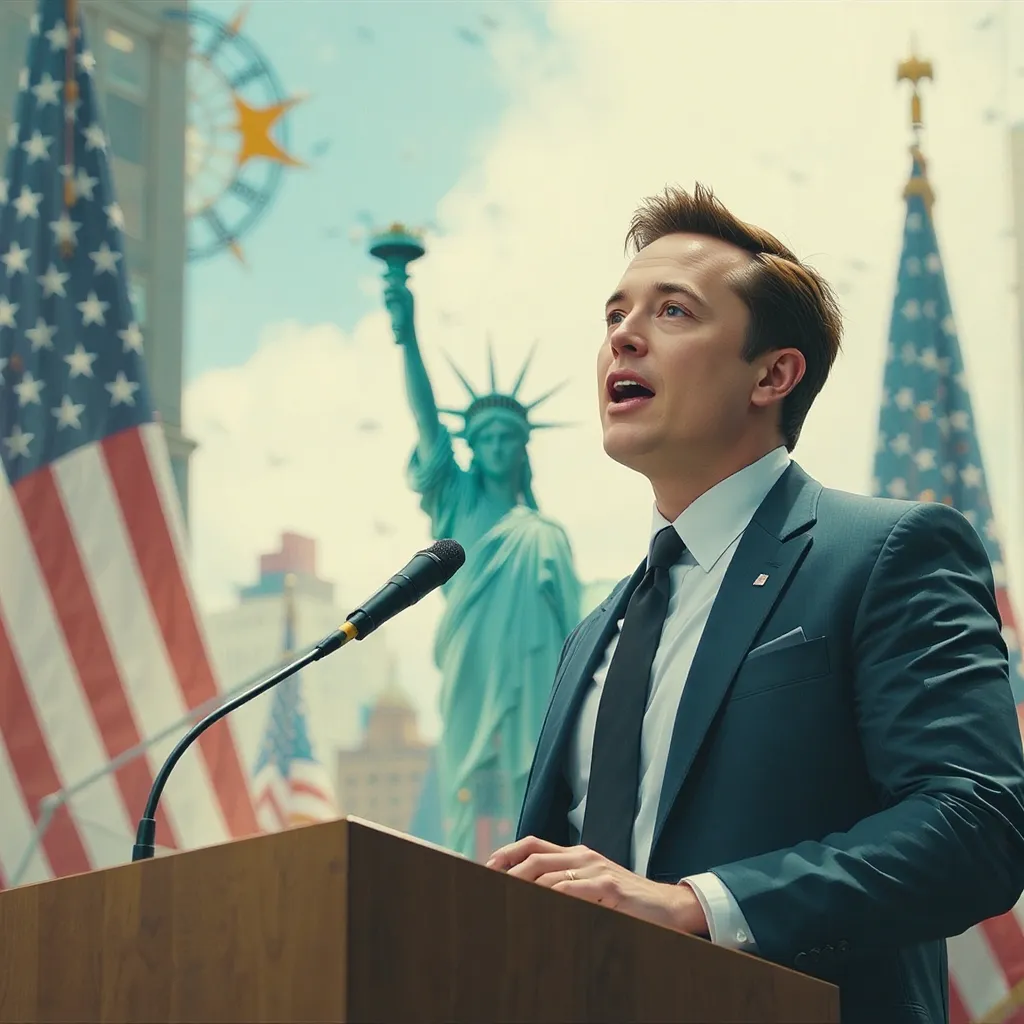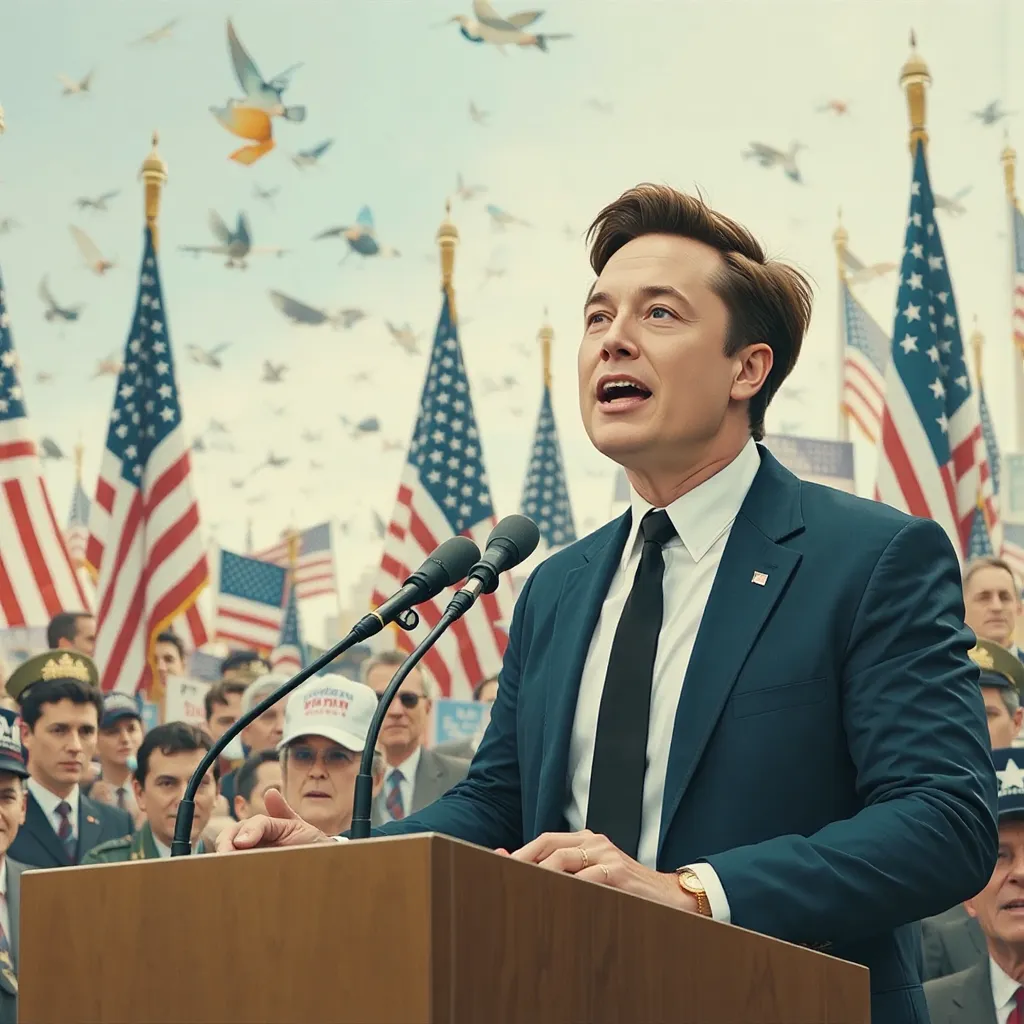Full-length magazine article about Elon Musk’s recent Support for Right-Wing Politics
Elon Musk’s Support for Right-Wing Politics
In recent years, few figures in American business and technology have generated as much controversy and debate as Elon Musk. Known for his pioneering work at Tesla, SpaceX, and X (formerly Twitter), Musk has increasingly become a polarizing political actor. His recent overt displays of support for right-wing politics and deepening relationship with President-elect Donald Trump have prompted a reexamination of the boundaries between private wealth and public governance. This article examines how Musk’s political trajectory—from a balanced donor to a major GOP megadonor and influencer—has unfolded, and what it portends for both American politics and the broader global landscape.

A Transformation in Political Alignment
Elon Musk’s political evolution is not a sudden, isolated incident but rather the culmination of decades of shifting allegiances and pragmatic interventions in political discourse. Early in his career, Musk was known to donate across party lines. According to Business Insider, he once split his contributions between Democrats and Republicans. This balancing act allowed him to secure a level of political favor that many of his billionaire peers had long mastered. Yet, as the political climate shifted, so too did Musk’s allegiance.
Today, his actions speak of a pronounced pivot toward right-wing interests. No longer content with maintaining political neutrality, Musk’s recent political donations position him squarely within the ranks of major GOP megadonors. His relentless financial backing through mechanisms such as America PAC, which, according to filings with the Federal Election Commission, poured nearly $119 million into President-elect Trump’s campaign, signals more than mere political support—it demonstrates a crafting of political influence at an unprecedented scale (CBS News; The Washington Post).
The transition from a bipartisan contributor to an influential right-wing advocate reflects an evolution not only in political strategy but also in personal ideology. Analysts note that Musk’s shift comes as he increasingly sees business-friendly deregulation, anti-immigration stances, and a more aggressive approach to government efficiency as necessary steps to ensure the growth and global competitiveness of his ventures.
The Symbiosis of Wealth and Politics
At the heart of Musk’s strategic pivot is the undeniable force of wealth in modern American politics. Musk stands as the richest person in the world—a status that lends him an enormous megaphone in political debates. With over $400 billion in combined wealth, his financial contributions have redefined the scale of political donations and their potential to sway policy debates. As noted by NBC News, his financial clout has become a key tool in his endeavor to support right-wing movements not just in the United States but globally.
Musk’s influence extends well beyond campaign finance. He is now deeply involved in policy matters, particularly through his appointment to lead the Department of Government Efficiency (DOGE) under the Trump administration. This special role is designed to streamline government spending and cut down bureaucratic excess—a mandate closely aligned with Musk’s business philosophy. Critics argue, however, that this concentration of authority in the hands of a non-elected billionaire threatens democratic norms and transparency. His public statements and tweets have frequently underscored his disdain for what he calls the “unelected, fourth, unconstitutional branch of government,” an assertion that has incited both admiration and alarm (BBC News).

The International Dimension: A Global Political Footprint
Musk’s political influence is not confined to American borders. His stance on immigration and government regulation has resonated in European political arenas as well, where he has openly supported far-right parties. In Germany, for example, Musk’s advocacy for nationalist policies has drawn strong rebuttals from political figures. As highlighted by CNN, German Chancellor Olaf Scholz has publicly condemned Musk’s interventions, describing his push for right-wing politics in Europe as “really disgusting.”
In one widely publicized instance, Musk participated in a virtual campaign event for the Alternative for Germany (AfD), a far-right party known for its hard-line views on immigration and German nationalism. At this event, Musk controversially urged German voters to “move beyond” their collective guilt over historical atrocities—remarks that ignited a firestorm of criticism from several quarters, including Jewish leaders and political figures across the continent (NPR). This episode not only reflects his growing commitment to advancing right-wing ideologies but also underscores the challenges posed by influential business leaders intervening in national political debates.
Social Media as a Political Battleground
No discussion of Musk’s political support would be complete without highlighting his use of social media. Since acquiring Twitter (now rebranded as X), Musk has leveraged the platform to cement his role as a political pundit. His social media presence serves as both a megaphone for his political beliefs and a tool to directly shape public discourse. By consistently endorsing right-wing policies and publicly criticizing political adversaries—including prominent Democrats—Musk has transformed his digital platform into a complex arena of political warfare.
Musk’s digital engagements have had tangible political implications. For instance, his tweets have helped boost far-right political movements in several countries. Analysts at NBC News point out that his social media endorsements have played a significant role in mobilizing support for conservative administrations in places as diverse as Brazil, Ireland, and New Zealand. This transnational influence, coupled with his vast financial resources, suggests that Musk’s political playbook is gaining traction as a model for how private wealth can assert influence beyond national borders.
Public Perception and the Political Divide
The polarization surrounding Musk’s political affiliations is stark. Recent surveys by the Pew Research Center reveal a divided public: while a significant majority of Republicans view Musk favorably, Democrats and ideological liberals tend to hold a very unfavorable opinion of him. This division mirrors broader trends in American political discourse, where perceptions of billionaire influence often underscore deep-seated ideological differences.
For Republicans, Musk’s engagement is seen as a necessary corrective—a way to inject business acumen into government and eradicate wasteful spending. His critics, however, argue that his unchecked influence undermines democratic accountability and promotes policies that favor corporate interests over those of the general populace. This dichotomy is emblematic of a wider debate over the intersection of wealth and power in America, a debate that shows no sign of abating as Musk continues to expand his political footprint.

Financial Firepower and Political Appointments
Musk’s recent political donations are not without precedent in the realm of billionaire influence, yet they stand out for their sheer scale and the directness of their impact. A series of recent filings illustrate that Musk has committed hundreds of millions of dollars to political causes that align with his vision for a streamlined, deregulated government. His funding of America PAC, which played a pivotal role in mobilizing support for Trump in key swing states, exemplifies how corporate money has become a potent political instrument.
Moreover, Musk’s role in the Trump administration is emblematic of a broader trend where financial power translates directly into governmental influence. His appointment to lead the Department of Government Efficiency is not a mere symbolic gesture; it is a calculated move that positions him at the nexus of politics and public policy. This appointment has drawn both praise and scorn. Supporters laud Musk for bringing innovative, business-like practices to government agencies, while detractors warn that his involvement could lead to a dangerous concentration of power in the hands of unelected elites (BBC News; CNN).
Critics also point to clear ethical dilemmas. When a billionaire wields such influence over public policy through both direct donations and key appointments, the lines between private ambition and public duty blur. This dynamic raises fundamental questions about the health of American democracy and the future of governance in an era where money is increasingly seen as a ticket to power.
The Rhetoric of Efficiency and National Pride
At the core of Musk’s political message is a call for efficiency—a promise that the bloated federal apparatus can be trimmed down through innovative management and cost-cutting measures. During a recent appearance in the Oval Office, Musk defended his sweeping plans to slash government spending. “It’s not optional for us to reduce the federal expenses; it’s essential for America to remain solvent as a country,” he declared, a statement that resonated strongly with many conservative voters entranced by the promise of leaner, more accountable governance (BBC News).
Yet this promise is intertwined with a nationalist fervor that has marked many of his recent interventions. Whether articulating his support for far-right parties in Europe or his criticism of traditional government structures, Musk’s rhetoric often veers into the territory of national pride. In Germany, for instance, he urged voters to “move beyond” the historical focus on Nazi guilt—a statement that not only sparked controversy but also underscored his willingness to plug into potent nationalist sentiments (NPR).
This potent mix of efficiency and nationalism represents a broader ideological shift. Musk’s approach is both a repudiation of what he sees as the inefficiencies of a sprawling bureaucracy and an embrace of a form of patriotism that is increasingly at odds with the cosmopolitan values of the modern state. Critics warn that this approach risks exacerbating social divisions and alienating minority communities at a time when inclusive governance is more critical than ever.

The Global Ripple Effects
Musk’s unabashed support for right-wing politics is not merely a domestic issue. His actions have reverberated around the world, influencing political debates in regions as diverse as Europe, South America, and even parts of Asia. His frequent endorsements of nationalist policies have led to a series of political interventions that some experts describe as part of a broader trend of “transnational right-wing solidarity.”
For example, in Brazil and Ireland, his online posts have bolstered local conservative movements, while in New Zealand, he welcomed the rise of a new conservative prime minister. His global outreach is underscored by his engagement with international political leaders, meeting with figures as far afield as Argentina’s right-wing politicians and Italy’s nationalist counterparts (NBC News).
This international dimension is perhaps the most alarming aspect of his political activities. While many American political commentators are accustomed to the influence of domestic donors, few anticipate the global implications of a billionaire championing right-wing causes across multiple continents. Musk’s approach is increasingly seen as a blueprint for how private wealth can be mobilized to shape political outcomes on an international scale—a development that has prompted both scholarly inquiry and policy debates about the future of global democracy.
Critics and Controversies
Every high-profile political intervention invites fierce scrutiny, and Musk’s support for right-wing politics is no exception. Detractors argue that his influence is not only disproportionate but also fundamentally undermines the democratic process. The specter of a “hostile takeover” of government institutions by an unelected billionaire has been repeatedly raised, with vocal critics warning that his interventions could set a dangerous precedent. As BBC News reported, Musk’s critics have characterized his actions as an affront to democratic norms and an abuse of power.
When he appeared at a White House briefing, Musk’s assertion that his cost-cutting measures were “common sense” sparked significant controversy. His critics contend that such rhetoric, while appealing to some segments of the electorate, glosses over the potential harms of concentrated power and diminished accountability. The fact that Musk’s political contributions have already influenced appointments and policy discussions within the Trump administration is seen by many as a clear example of how the sanctity of democratic institutions can be compromised by the unchecked power of private wealth.
Moreover, his interventions have not been without direct political repercussions. In Europe, for example, his rallying support for nationalist parties in Germany has met with protests and condemnations from various political leaders and civic groups. German Chancellor Olaf Scholz’s vehement criticism of Musk’s actions underscores the deep unease that many feel about the billionaire’s expanding political role (CNN). This backlash is a reminder that while Musk’s strategies may win him supporters in some quarters, they also galvanize opposition from those who see his actions as emblematic of a trend that endangers the very foundations of democratic governance.
The Broader Implications for Democracy
At its core, Elon Musk’s political journey raises profound questions about the interplay between wealth, power, and democracy. As Musk continues to leverage both his financial resources and his vast social media following, the implications for American politics—and indeed for global political norms—are significant. His actions have sparked renewed debate about the role of money in politics, the influence of unelected actors in shaping public policy, and the potential risks of a political system that increasingly relies on private financing for public influence.
The emergence of figures like Musk signals a new era in which the boundaries between business and government are increasingly blurred. His forays into the political sphere are a stark illustration of how a dominant figure in the private sector can directly shape the policy landscape and influence elections. For democratic societies, this raises critical concerns about accountability, transparency, and the equitable representation of all citizens. The challenge remains how to balance the benefits of innovation and efficiency with the imperatives of democratic governance and public oversight.

In Search of a New Political Paradigm
In confronting the challenges posed by Elon Musk’s political influence, critics and supporters alike are forced to reconsider what it means to participate in modern democracy. Musk’s rise as a political force embodies the paradox of our times: the promise of private innovation and efficiency sits side by side with the peril of concentrated power and reduced accountability. As public debates continue to rage, there is a growing call for mechanisms to ensure that the voices of ordinary citizens are not drowned out by those of the wealthy elite.
Some policy analysts suggest that reforms to campaign finance laws and stricter oversight on political appointments could help mitigate the dangers of unchecked influence. Others argue that the solution lies in strengthening institutional checks and balances to ensure that even the most powerful private actors remain accountable to the public. As discussions intensify, the debate over Musk’s role in public life serves as a microcosm for broader questions about the future of governance in an age defined by rapid technological change and unprecedented wealth concentration.
Conclusion: Navigating the Crossroads
Elon Musk’s evolution from a bipartisan donor to a key advocate of right-wing politics is emblematic of a broader transformation occurring at the intersection of technology, wealth, and political power. His deepening involvement in shaping policy—both in the United States and abroad—poses critical challenges to the traditional paradigms of democratic governance. On one hand, his support for deregulation and government efficiency resonates with a segment of the electorate eager for change. On the other, his unilateral brand of political activism raises serious concerns about accountability and the risks of concentrating power in the hands of a single, wealthy individual.
As Musk continues to redefine the landscape of political influence, his actions serve as both a catalyst for change and a wake-up call. They force society to ask difficult questions about how power should be wielded in a modern democracy and what safeguards must be put in place to protect the public interest. In this ongoing debate, the stakes could not be higher. The future of democratic governance may well depend on our ability to balance the allure of private innovation and efficiency with the timeless demands of transparency, accountability, and public service.
In an era increasingly defined by the collision of entrepreneurial ambition and political authority, Elon Musk remains one of its most captivating—and controversial—figures. Whether his support for right-wing politics ultimately heralds a new model of governance or portends the erosion of democratic norms is a question that will reverberate for years to come. For now, the debate continues, fueled by the potent mix of wealth, technology, and ideology that defines the twenty-first century.
This intricate dance between corporate influence and public policy forces a reckoning with the age-old conflict between freedom and control. As we watch the unfolding drama of Elon Musk’s political involvement, one thing is clear: the convergence of technology and politics has never been more complex, and the outcome remains uncertain.
By examining Musk’s journey—from his early contributions to both sides of the political spectrum to his current unabashed advocacy for a right-wing agenda—we gain insights into the shifting dynamics of power in contemporary society. For voters, policymakers, and political observers alike, this is a moment of profound transformation, one that calls for vigilance, debate, and ultimately, a reimagining of what democracy should mean in a rapidly changing world.
(Article sources include Business Insider, CBS News, The Washington Post, NBC News, BBC News, NPR, and Pew Research Center.)
As we navigate this new political paradigm, only time will reveal whether Musk’s brand of entrepreneurial activism will forge a legacy of reform and efficiency or undermine the democratic institutions upon which modern society is built.
In a world where technology continues to reshape the political landscape, the saga of Elon Musk serves as both a mirror and a magnifier of the challenges—and opportunities—facing democracy today.
#article #DOGE #elon #musk #notes #politics #rightwing #spacex #tesla






